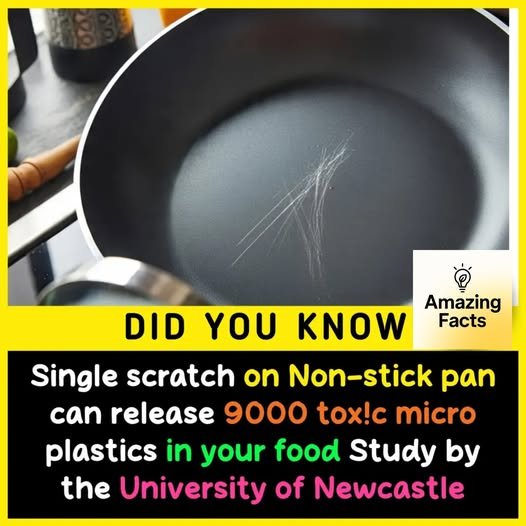These particles, called microplastics and nanoplastics, come from the Teflon coating, which helps make the pan non-stick. In just one small scratch, over 9,000 of these particles can be released. If the pan is badly damaged, even more—up to 2 million—can get into your food. These plastics don’t break down easily and may be harmful to your health over time. To stay safe, it’s best to replace scratched pans and use soft utensils like wood or silicone when cooking.
Key Findings from the Study
- Conducted by researchers in Australia, the study showed that:
- A single scratch on a non-stick Teflon-coated pan can release around 9,000 microplastic and nanoplastic particles.
- A badly damaged non-stick surface can release up to 2.3 million particles into your food.
- These particles are made of PTFE (polytetrafluoroethylene), the synthetic polymer used to create the non-stick surface.
⚠️ Why It Matter
- Microplastics and nanoplastics don’t break down easily and can accumulate in your body over time.
- Scientists are still researching the long-term health effects, but potential risks include:
- Inflammation or damage to the gut lining
- Disruption to hormone function
- Introduction of toxic additives or contaminants
🥄 Practical Safety Tips
To reduce your exposure:
✅ DO:
- Use wooden, silicone, or plastic utensils (never metal) on non-stick pans.
- Replace pans as soon as the surface is scratched, peeling, or showing wear.
- Hand wash non-stick pans gently instead of using abrasive sponges or dishwashers.
- Cook at low to medium heat—extreme heat can degrade the coating faster.
❌ AVOID:
- Using metal spatulas or forks on non-stick pans.
- Stacking non-stick pans directly without protection (use pan protectors or paper towels).
- Continuing to use a chipped or flaking pan.
🔄 Alternatives to Teflon
If you’re concerned, consider switching to safer, more durable options:
| Type | Pros | Cons |
|---|---|---|
| Ceramic Coated | Non-stick, PTFE-free | Can wear out over time |
| Cast Iron | Naturally non-stick when seasoned | Heavy, needs maintenance |
| Stainless Steel | Durable, no coating | Requires oil or skill for non-stick cooking |
| Carbon Steel | Similar to cast iron but lighter | Needs seasoning |



